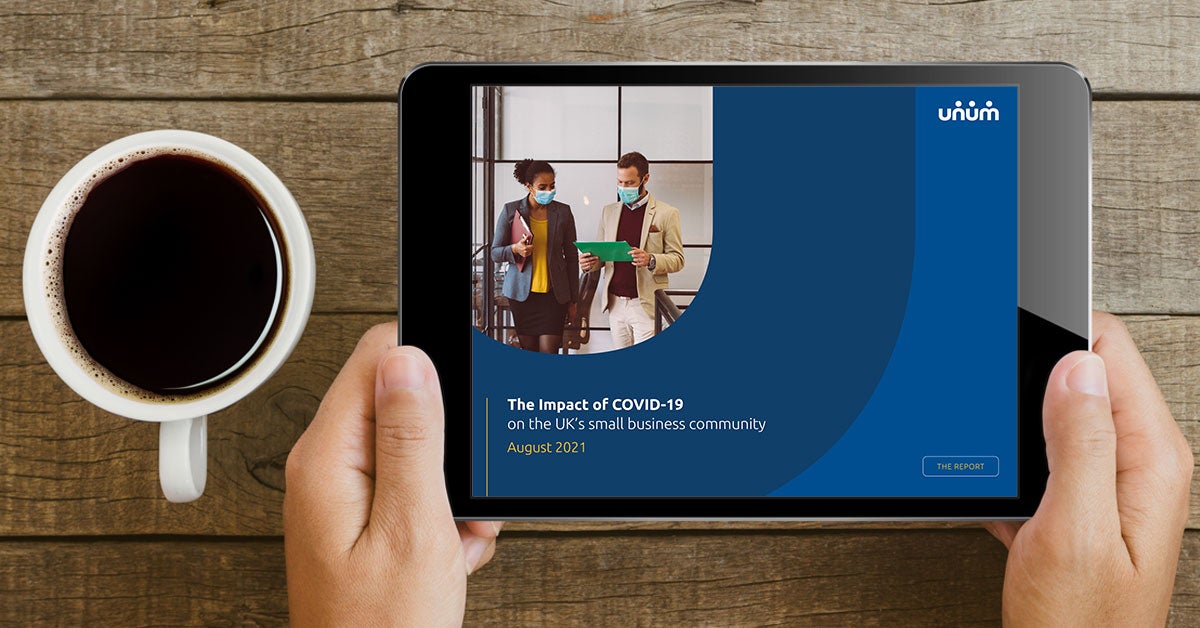
Unum offers brokers vital insight into impact of COVID-19 on SMEs
September 29 saw Unum present exclusive research to brokers on the impact of COVID-19 on the UK’s small and medium-sized enterprises (SMEs).
The 30-minute webinar included an introduction from John Bettinson, Strategic Insight Manager at Unum, on the background to the data, plus comments from Simon Hodgson, Head of Public Policy at Unum, on the general impact of ill health on the UK economy and how the government, insurance providers and brokers can collaborate to mitigate it.
The session saw Unum detailing key points from the research, which questioned more than 1,000 SME owners and decision makers in two waves (in 2019 and again in 2021). This timeframe offered great insight into the impact of the pandemic on employers’ answers.
Research overview
Highlights include:
- An increasingly challenging business environment
41% of SMEs lost a large client or experienced adverse market conditions in 2021, up from 29% in 2019 - COVID-19 infection statistics
45% of SMEs had at least one staff member diagnosed with COVID-19; 35% had a staff member with long COVID (where COVID symptoms persist for at least 12 weeks) - The financial impact of COVID-19
33% of SMEs reporting a COVID-19 diagnosis said long-term sickness absence had caused a ‘critical’ impact on company finances and business success, rising to 38% of SMEs reporting an employee diagnosed with long COVID - COVID-19 and its effects on employees
56% of SMEs say the pandemic has led to new work-related mental health risks among employees - Changing mindsets
48% of SME owners say the pandemic will change how we handle workplace health forever, while the proportion of employers saying businesses have a moral obligation to help staff back to work after sickness absence rose from 50% in 2019 to 64% in 2021.1
For a more in-depth look at the figures, we produced an entire report on the findings. It’s available to download here.
Worthwhile lessons for insurers and brokers
The webinar also raised several areas where the insurance industry and brokers could support small companies as they become increasingly aware of the need to protect their employees and manage sickness absence after the pandemic.
Insurers must simplify their product offerings to better meet the needs of smaller firms and invest in technology and other areas to make doing business with SMEs easier.
Meanwhile, although most brokers support the SME community very well, there remains room to tailor advice specifically to this sector and their evolving needs.
Another recommendation is to help SMEs look beyond the overall price of cover in pounds and pence and instead at its value. While ultimately price is a big driving factor for many SMEs, which often have tighter budgets than larger firms, their needs mean that wider accompanying benefits beyond ‘just’ insurance are arguably more valuable.
For example, absenteeism can hit SMEs harder than their larger rivals in terms of impact to their business. This is because, being smaller, SMEs find it more difficult to redistribute workloads and the knowledge of an absent employee.2
Benefits that reduce the risk of absence and offer vocational rehabilitation should it occur are therefore particularly powerful for SMEs, who gain from reducing absenteeism and getting employees back to work faster if they become ill or injured.
Simon Hodgson, Unum’s Head of Public Policy, notes:
“In addition to the wider economic downturn caused by the pandemic, many of the SMEs surveyed were directly impacted by sickness absence, with 33% of surveyed businesses who had an employee diagnosed with COVID-19 reporting a critical or significant hit to their finances.
“Despite these challenges, there are reasons to be optimistic. There’s a growing appetite from SMEs to look after employees’ health and wellbeing. It’s here a Group Income Protection policy such as Unum’s that includes a full vocational rehabilitation service with a 95% success rate3 at keeping people in their jobs, getting them back to work or resolving their case could be incredibly valuable for SMEs beyond providing vital insurance for their staff.
“Our exclusive research also highlights just what SMEs can achieve with a high-quality health and wellbeing offering. We found that SMEs with a proactive approach to managing sickness absence and went “well beyond legal requirements” were 2.3 times less likely to have lost an employee for health reasons in the previous year compared to firms simply complying with the minimum statutory requirements.
“We want to see more SMEs and their employees benefit and call on policymakers to look at how businesses new to health and wellbeing can best be can best be helped to introduce support for their employees.”
The webinar discusses all these topics and more. If you missed the chance to catch it live, it’s now available to watch anytime anywhere.
1 Cicero/amo consumer research: Survey conducted with 1,055 decision makers on the impact of COVID-19 in businesses employing up to 249 employees, May 2021
2 Department for Work and Pensions, Sickness absence and health in the workplace: Understanding employer behaviour and practice, July 2021, p.55
3 Unum internal data, 2020
We're here to help
Have a question or can’t find what you’re looking for? Get in touch with us.
Contact us